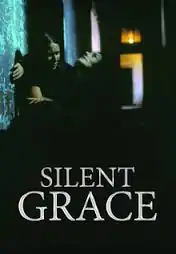Silent Grace
Silent Grace is a critically acclaimed feature film written and directed by Maeve Murphy and was made no. 38 in the Irish Times Best 50 Irish films ever made list on the 2nd of May 2020.[1] It is about friendship and survival. A fictional story based on real events, covering the untold story of Republican women prisoners involvement in the 1980/81 Dirty Protest and first hunger strike. It is inspired by Nell McCafferty's The Armagh Women and based on the play/screenplay "Now and at the hour of our Death" that Murphy co-wrote with theatre company Trouble and Strife. Silent Grace stars Orla Brady, Cathleen Bradley, with Cara Seymour, Dawn Bradfield, Carol Scanlan, Conor Mullen, and Patrick Bergin. It received completion funds from The Irish Film Board.
| Silent Grace | |
|---|---|
 Theatrical poster | |
| Directed by | Maeve Murphy |
| Produced by | Gerry McColgan Deirdre McMahon |
| Written by | Maeve Murphy |
| Starring | Orla Brady Cathleen Bradley |
| Cinematography | David Katznelson |
| Edited by | Breege Rowley |
Release date |
|
| Country | Ireland |
| Language | English |
Silent Grace was chosen as the UK entry for the Cannes Film Festival in 2002 but as it previously screened in the Cannes market in 2001, it could not be considered any further for competition. The film premiered at the Galway Film Fleadh 2001. It then was selected for the Taormina, Moscow, Foyle, Dinard and Hamptons International Film Festival USA (nominated for the Conflict and Resolution Award). A small cinema release followed in UK/Ireland via Guerilla Films in 2004. Silent Grace was critically acclaimed, and was awarded the Soka Art Award (Japan).
Silent Grace experienced a revival and wider audience in 2017 after 3 major articles in the Irish Times Culture section about the women and the film that had been written out of history. On 24 June 2017, TV3 gave Silent Grace its nationwide broadcast premiere at primetime, in the Republic of Ireland, on Be3. TV3 said in IFTN "Silent Grace firmly puts women back in the 1980s narrative and makes compelling viewing". The Sunday Times made it one of the "Films of the Week"
Plot
Aine a young tear away criminal is thrown into the same cell as Eileen, a high ranking Republican woman leader. At first at odds, Eileen helps save Aine's sanity. An unlikely friendship develops between them as Aine joins the protest and Eileen helps her to survive. In a remarkable turn around of events when Eileen embarks on a hunger strike, Aine risks all to help save her life...
Cast
- Orla Brady as Eileen
- Cathleen Bradley as Aine
- Cara Seymour as Margaret
- Dawn Bradley as Geraldine
- Carol Scanlan as Aine's Mother
- Rob Newman as Father McGarry
- Conor Mullen as the Governor
- Patrick Bergin as Peter/IRA Leader
Reception
Silent Grace was critically acclaimed. Michael Dwyer in the Irish Times[2] gave it 3 stars and said it was "unusually even-handed, well judged... rooted in its humanist agenda, surmounts the limits of its very low budget, to emerge as a work of sincerity and concern." Tara Brady wrote in Dublin's Hot Press,[3] where it was Critics Choice, "Maeve Murphy must be some kind of genius... brilliantly confounds expectations... compelling coming of age drama, wonderfully humane... Orla Brady is magnificent.... I urge you to seek it out". Larushka Ivan-Zadeh in the Metro in London gave it 4 stars "compelling." And it was in their Top Ten Films for 2 weeks. Peter Bradshaw, The Guardian[4] said it "bodes well for Murphy's future movies'. Ronnie Schieb in Variety,[5] David Parkinson in The Radio Times,[6] The Evening Standard, Rich Cline in Shadows on the Wall,[7] Anton Bietel in Movie Gazette, Belfast Telegraph and The Huffington Post[8] reviewed it favourably.
However, as more films were made about the male hunger strikers, Silent Grace often ceased to be mentioned in the hunger strike film discourse. It wasn't until its 2017 revival when it was placed fully back on the map due to the promoting of the film from the Irish Times[9][10][11] and TV3.[12] Silent Grace was received very favourably, with a fresh review in The Irish Times Film Section and selected "Films of the Week" in The Sunday Times. Maeve Murphy and Patrick Bergin appeared on Breakfast TV on TV3 for the debut broadcast at prime time.[13] Ratings were good.
In May 2020 the Irish Times listed Silent Grace as number 38 in their list of the 50 greatest Irish films of all time [14]
References
- https://www.irishtimes.com/culture/film/the-50-best-irish-films-ever-made-in-order-1.4238979
- "DIRTY WAR".
- "Silent Grace - Film Review - Film - Hot Press". Hot Press - Music News, Reviews, Interviews plus Pop Culture and Politics.
- "Silent Grace - Reviews - guardian.co.uk Film". www.theguardian.com.
- Scheib, Ronnie (10 November 2002). "Silent Grace".
- "Silent Grace – review - cast and crew, movie star rating and where to watch film on TV and online". Radio Times.
- "Shadows on the Wall - Silent Grace". www.shadowsonthewall.co.uk.
- "Silent Grace: A Film Review". HuffPost UK.
- "Silent Grace and women's hands: arming female militancy".
- "Silent Grace and silenced women's voices".
- "Time to stop force-feeding us a male cultural history".
- "Silent Grace to have TV Premiere on be3 Saturday at 21:00 - The Irish Film & Television Network". www.iftn.ie.
- Patrick Bergin and Maeve Murphy talk 'Silent Grace' TV3 Group
- https://www.irishtimes.com/culture/film/the-50-best-irish-films-ever-made-in-order-1.4238979